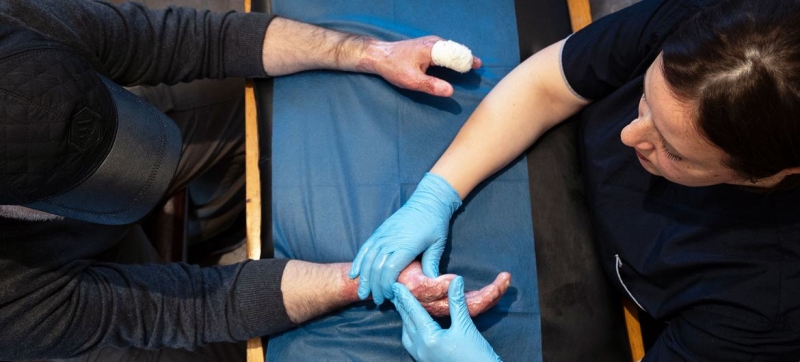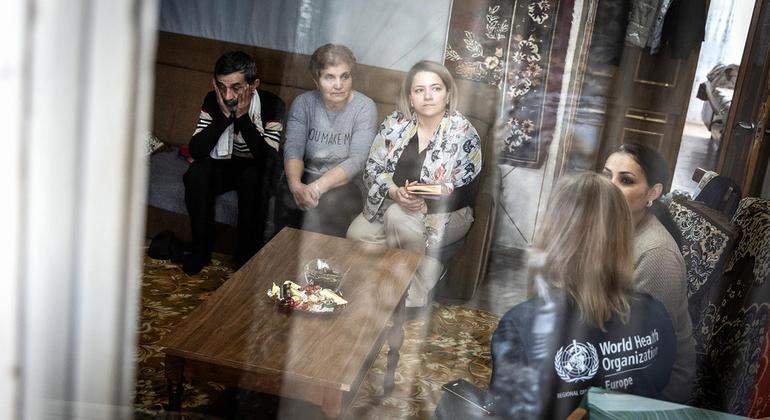
Physiotherapy skills are critical to helping patients regain independence and mobility after severe injuries to the skin, muscles and connective tissues. WHO assistance to Armenia: six months later, gaps remain Health
Since September 2023, the World Health Organization (WHO) has been supporting the Government of Armenia to address the health needs of more than 115 thousand refugees who arrived from the Karabakh region last fall.
WHO strengthened Armenia’s mental health and psychosocial care system, provided trauma care and rehabilitation for burn patients, and supported vaccination campaigns to prevent infectious disease outbreaks. International emergency medical teams, specializing in burn treatment and emergency evacuation of patients, worked alongside Armenian medical personnel from the early stages of treatment through efforts to rehabilitate patients.
“We never didn’t feel alone”
At the first stage of care, emergency doctors performed about 600 surgical operations and supported early physical rehabilitation of burn patients. Some of them – for medical reasons – along with their families were evacuated for specialized treatment in the USA and European countries.
Six months after the explosion of a fuel depot in Karabakh, with the constant support of Armenian doctors, burn patients continue their long and difficult path to recovery. Dr. Karina Babayan, deputy director of the National Center for Burns and Dermatology of Armenia, monitors their treatment and rehabilitation.
“Currently there is only one burn patient left in our hospital,” she says. “As a result of the explosion, he received burns over 80 percent of his body, and he had deep wounds on his face and limbs. Most patients with this condition, unfortunately, do not recover, but he is on the mend. This gives us a feeling of optimism. Without the support of our partners, the death toll would be much higher. We never felt alone.”

Long road to recovery
International ambulance teams sent to Armenia strengthened the capacity of national medical institutions and hospitals. They not only performed surgical operations to save burn patients, but also participated in the process of training local medical staff and exchanging experience in the field of rehabilitation. Such trainings have expanded knowledge, skills and understanding of burn treatment and rehabilitation of burn patients, as well as strengthened the capacity of local specialists in the field of burn medicine.
“We are committed to continuous progress , said Marina Sergeeva, rehabilitation therapist at the National Center for Burns and Dermatology in Armenia. “Watching the steady improvement in the condition of those affected is deeply satisfying.” psychiatric assistance to Armenian refugees and the host population. Research shows that support in this area is now in great demand in Armenia.
A mobile team of specialists travels weekly to affected communities to provide immediate mental health and psychological assistance. To date, more than a thousand people have received consultations, of whom 16 percent are children and 35 percent are elderly.
WHO also continues to expand the capacity of its hotline. Operators listen to and refer people who suffer from anxiety or depression, or those who are experiencing suicidal thoughts. Over the past six months, operators have answered a total of 4,546 calls.
Psychiatrist Vahan Simonyan from the mobile team says that despite current efforts, the need for mental health care in Armenians are still great: “After six months, we diagnose long-term chronic diseases such as depression. Refugees came with mental health histories and are now showing dangerous symptoms.”
Protecting Against Disease Outbreaks
One of the core aspects of WHO’s refugee health work is the prevention, detection and control of disease outbreaks among refugees and host populations.
Pediatricians and immunization coordinators from 370 primary health care centers – health care providers throughout Armenia were trained on WHO guidelines in the provision of immunization services for refugees. They then supported national medical teams in carrying out a nationwide vaccination campaign, raising awareness among the population and at-risk groups about the importance of vaccinations against dangerous diseases.
